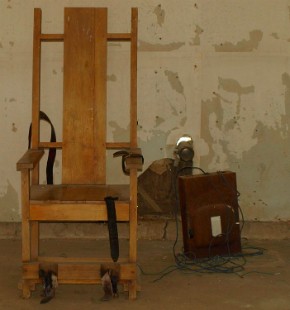Instruments of death: Can there be a humane execution?

Americans’ support for capital punishment has waned for a number of reasons: concern that wrongfully convicted persons may be executed; doubts that the death penalty acts as a deterrent; worries about economic and racial biases in capital cases; and concerns about the financial costs involved.
The focus has shifted recently to the methods of execution. In July, it took nearly two hours for Arizona inmate Joseph Woods to die by lethal injection, and observers repeatedly heard him gasp for air. In late April, Oklahoma prison officials had to stop the process of killing Clayton Lockett by lethal injection because of “vein failure.” Lockett was observed writhing and trying to speak 14 minutes into the process, and he died of a heart attack 43 minutes after the execution began. At an execution in Ohio in January, Dennis McGuire appeared to gasp for breath several times during the 25 minutes it took for an untested two-drug cocktail to cause his death.
Read our latest issue or browse back issues.
Though the Constitution, according to the Supreme Court, does not prohibit capital punishment, the Eighth Amendment rules out cruel and unusual punishment. Some means of execution seem to be exactly that.
For the federal government and the 32 states that have the death penalty, lethal injection has come to be the primary means of execution. It is, for many people, the most humane. However, because pharmaceutical companies and European nations are increasingly opposed to providing the drugs used in capital punishment, officials are finding it more difficult to administer lethal injections.
In response, a number of states may go back to what Dan Barry in the New York Times has called “retro-style” solutions—the use of firing squads and the electric chair. In May, Tennessee governor Bill Haslam signed into law a bill that allows for electrocution if lethal injection drugs are unavailable. In Utah, state legislator Paul Ray has proposed reintroducing execution by firing squad, saying it is “probably the most humane way to kill somebody” given that the “prisoner dies instantly” and “there’s no suffering.” Fordham University law professor Deborah W. Denno, an expert on the death penalty, has said that a firing squad is “the most humane procedure.”
Some people may not care about the method for putting an offender to death. Indeed, some may exclaim, “Let them suffer!” Those who murdered someone’s loved one, some argue, should be made to suffer just like the victim. Yet executing an offender—whatever level of suffering is involved in the death—cannot make up for what he has done.
My own reflections on capital punishment began 30 years ago when, at the age of 19, I became one of the youngest corrections officers at the maximum-security jail in Clearwater, Florida. My mother and stepfather were patrol deputies for the Pinellas County Sheriff’s Office. When I graduated from high school, I had in mind a career in law, and they suggested that I apply for a job with the sheriff’s department while I worked my way through college. For four years I was assigned to various jobs, including booking new arrestees, monitoring inmates from a control room, and doing guard duty in a tower.
Although at the time I more or less supported capital punishment, I recall feeling uncomfortable when one of my fellow officers proudly announced that his dream job would be pulling the lever on “Old Sparky,” the electric chair at the state prison in Starke.
That remark surfaced in my mind this past spring when I was teaching an ethics course for staff at the Eastern Reception, Diagnostic and Correctional Center, where executions are carried out, in Missouri. Two offenders were executed during the weeks our class met.
Like Ohio, Oklahoma, and other states, Missouri has encountered problems with lethal injection. It has used a fairly standard protocol involving three different drugs injected one after the other. The first one injected is sodium thiopental, an anesthetic meant to make the prisoner unconscious. The second, pancuronium bromide, paralyzes the prisoner’s muscles. The third, potassium chloride, causes the prisoner’s heart to stop beating.
But things do not always go as planned. As Sister Helen Prejean observes in Dead Man Walking, an account about her ministry on death row: “Anything that human beings do can go wrong.”
A few years ago a surgeon in charge of the three-drug protocol in Missouri admitted making mistakes because he was dyslexic. Subsequently, Missouri sought to recruit an anesthesiologist and sent a letter to 300 possible candidates. The American Society of Anesthesiology advised candidates not to volunteer. Apparently, it is difficult to get health-care professionals—sworn to uphold the Hippocratic oath—to participate in state-sanctioned executions.
In her contribution to the award-winning Where Justice and Mercy Meet: Catholic Opposition to the Death Penalty, Kim Philip Hansen, a sociologist who has studied the medicalization of death and dying, points out that the use of IVs, heart monitors, and other medical equipment during a lethal injection gives “the impression that you’re in a hospital.” An attendant even swabs alcohol on the arm of the person to be executed before inserting the needle. As Prejean observes, killing is “camouflaged as a medicinal act.”
Other methods of execution (gassing, hanging, shooting, electrocuting) may be uglier, Prejean notes, but lethal injection is still ugly. The prisoner cannot move, flinch, or yell because of the effects of pancuronium bromide.
Prejean speculates that the secrecy and medicalization associated with the death penalty “numbs our minds to the horror of what we are doing.” She believes that executions have a “coarsening” effect on society, even if it is “more subtle” than it was when executions took place in the public square.
Prejean is a Catholic nun who has been nominated for the Nobel Peace Prize for her activism against the death penalty. Pope John Paul II was against the death penalty, and during his visit to St. Louis 25 years ago he asked the governor of Missouri to put an end to capital punishment. Groups like the community of Sant’Egidio and the Catholic Mobilizing Network to End the Use of the Death Penalty have called for its abolition. More and more people are morally opposed to it in principle, believing that the purpose of capital punishment—namely, justly punishing a convicted murderer—can be achieved by other means, such as life imprisonment without parole. (Whether life without parole is itself a legitimate punishment is the topic of another debate.)
The Catechism of the Catholic Church upholds the punishment of criminals as long as it is “proportionate to the gravity of the offense,” aimed primarily at “redressing the disorder introduced by the offense,” protects “people’s safety,” and, “as far as possible,” contributes to “the correction of the guilty party.” With regard to capital punishment, more specifically, the Catechism acknowledges that “the traditional teaching of the Church does not exclude recourse to the death penalty.” Nevertheless, the Catechism holds that an execution is morally justified “if this is the only way of effectively defending human lives against the unjust aggressor.” In other words, killing an offender is justified if it is the only way to protect society against a grave and imminent threat.
That reasoning explains why the Catechism’s treatment of capital punishment comes under the section titled “legitimate defense” rather than “punishment.” The legitimate goals of punishment (redress and correction) do not apply in death penalty cases because the execution of the offender cannot really make up for the crime committed and, obviously, a dead person can no longer be “corrected.”
According to the Catechism, if “nonlethal means” exist to “defend and protect people’s safety from the aggressor,” then the governing authority must “limit itself to such means.” Given that such means indeed exist in much of the modern world, the Catechism concludes, quoting the sainted John Paul II, that the instances wherein an execution is absolutely necessary “are very rare, if not practically nonexistent.”
Under the terms of the Catechism, capital punishment may be justified in a country that does not have maximum-security prisons. Or it may be justified in an unusual situation, like one I experienced while working at the jail. During a hurricane, I was assigned to the roof and armed with a shotgun to make sure no prisoners escaped if the power were to be knocked out or the facility’s physical integrity were compromised. In those circumstances, the use of lethal force on my part would, according to the Catechism, be legitimate as an act of defending society, not as an act of punishment.
The Catechism says that nonlethal means of protecting society from offenders are more consonant with both the common good of society and “the dignity of the human person.” In his encyclical Evangelium Vitae, John Paul II emphasized, “Not even a murderer loses his personal dignity.” The Catholic tradition also prohibits torture as intrinsically evil and never morally justifiable. This seems theologically and ethically analogous to the Eighth Amendment’s prohibition against cruel and unusual punishment.
As a corrections officer and later as a reserve police officer I have dealt with many repugnant criminals and seen the horrible effects of their offenses. Nevertheless, I believe that even murderers should be treated in a way that respects the dignity of the person.
I worry also about the coarsening effect that the means of execution employed have on society and its common good. And I care about the dignity of the executioner, the corrections officers, and other prison staff involved in the death penalty. Participating in an execution does something to you. The movie version of Dead Man Walking includes a scene in which Prejean converses with a corrections officer who admits that he could not sleep before an execution. I myself have seen how some corrections officers and prison staff wrestle with being part of an execution—even if they think that what they are doing is morally right.
Catholic philosopher John Finnis notes in Fundamentals of Ethics that our actions have both transitive effects, which are the consequences on others, and intransitive effects, which are the consequences for ourselves and our character. The way that executions are carried out reflects this awareness. After all, why have one of the rifles in a firing squad loaded with blanks apart from a desire to diffuse responsibility? Or why try to make an execution seem so much like a medical procedure?
A corrections officer who believes that participation in an execution is morally justified may still experience something akin to the kind of “moral injury” that soldiers experience in war. Maybe this is why the Roman Catholic Church used to require penance for executioners as well as for those involved in fighting even just wars.
As a Roman Catholic I have come to oppose capital punishment for biblical, moral, practical, and theological reasons (including Protestant theologian Karl Barth’s question, “Now that Jesus Christ has been nailed to the cross for the sins of the world, how can we still use the thought of expiation to establish the death penalty?”). In theory, I think that if capital punishment is to be used, it should be implemented in the most humane way. But is there any humane way? It appears not. There is no method of killing that might not turn into a form of torture for the person being executed. Furthermore, there is no means of carrying out the death penalty that is not inevitably morally injurious to the executioners. The recent botched executions and the subsequent discussion of the means of execution present yet a further reason to oppose capital punishment.





